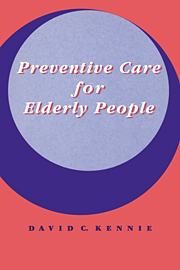Book contents
- Frontmatter
- Contents
- Acknowledgements
- 1 An overall perspective
- 2 What is health in old age?
- 3 The goals of health promotion for elderly people
- 4 A task for everyone
- 5 Critique of strategies
- 6 Cancer prevention
- 7 The prevention of non-cancerous health problems
- 8 Enhancing functional status
- 9 Strengthening support systems
- 10 Summary of problems and strategies
- 11 Tailoring strategies to individuals
- 12 Targeting, screening and surveillance in primary care
- 13 Practical aspects of implementation
- 14 The costs of preventive care and health promotion
- Index
1 - An overall perspective
Published online by Cambridge University Press: 15 October 2009
- Frontmatter
- Contents
- Acknowledgements
- 1 An overall perspective
- 2 What is health in old age?
- 3 The goals of health promotion for elderly people
- 4 A task for everyone
- 5 Critique of strategies
- 6 Cancer prevention
- 7 The prevention of non-cancerous health problems
- 8 Enhancing functional status
- 9 Strengthening support systems
- 10 Summary of problems and strategies
- 11 Tailoring strategies to individuals
- 12 Targeting, screening and surveillance in primary care
- 13 Practical aspects of implementation
- 14 The costs of preventive care and health promotion
- Index
Summary
This book is concerned with promoting the good health of individuals who have already reached old age. This may be achieved by a number of strategies that have been variously described as preventive health care, health promotion or health maintenance. Unlike the situation for younger people, however, interest and knowledge about the preventable problems of old age and strategies to combat these problems are still in their infancy. Irrespective of the age group under consideration, there is also a good deal of emotional controversy surrounding many preventive care strategies. Several of these issues are discussed in detail in later sections of this book. This chapter broadly sets the scene for health promotion and preventive care and begins by defining what is meant by the terms elderly people and old age.
What is meant by old age?
This book concentrates on people who have already reached old age or who are elderly persons. The concept of what is meant by these terms has changed gradually throughout human history and has altered markedly in the last hundred years. In previous centuries, because of the considerably shorter life expectancy, older members of society would be those who, in present day terms, might not yet have reached middle age. However, from the early part of the twentieth century, the age when someone becomes ‘elderly’ has, for largely political and economic reasons, been considered to start around the age of retiral at 60 to 65 years.
- Type
- Chapter
- Information
- Preventive Care for Elderly People , pp. 1 - 13Publisher: Cambridge University PressPrint publication year: 1993



